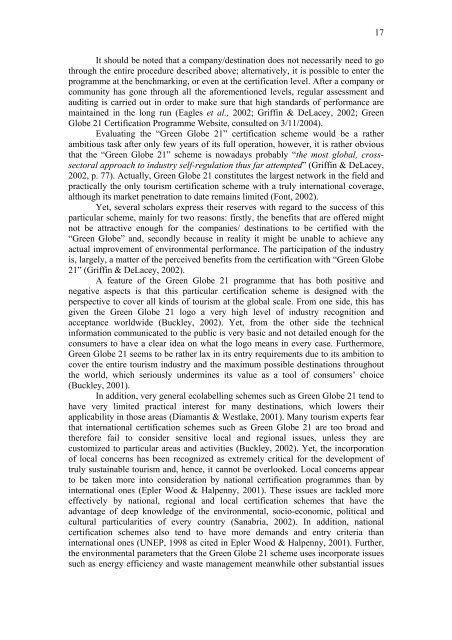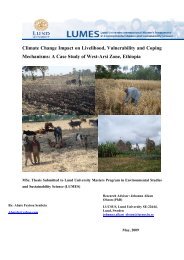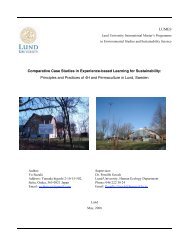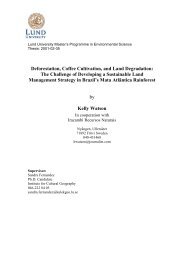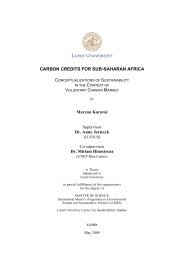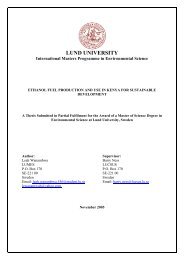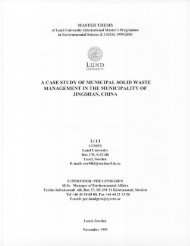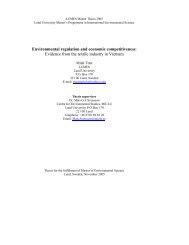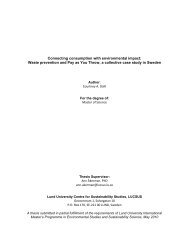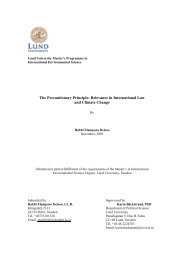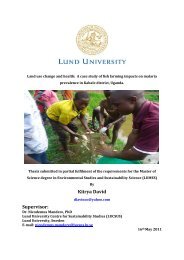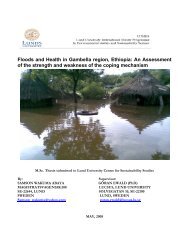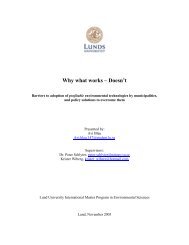Thesis title: âThe development of community-based ecotourism - lumes
Thesis title: âThe development of community-based ecotourism - lumes
Thesis title: âThe development of community-based ecotourism - lumes
You also want an ePaper? Increase the reach of your titles
YUMPU automatically turns print PDFs into web optimized ePapers that Google loves.
It should be noted that a company/destination does not necessarily need to gothrough the entire procedure described above; alternatively, it is possible to enter theprogramme at the benchmarking, or even at the certification level. After a company or<strong>community</strong> has gone through all the aforementioned levels, regular assessment andauditing is carried out in order to make sure that high standards <strong>of</strong> performance aremaintained in the long run (Eagles et al., 2002; Griffin & DeLacey, 2002; GreenGlobe 21 Certification Programme Website, consulted on 3/11/2004).Evaluating the “Green Globe 21” certification scheme would be a ratherambitious task after only few years <strong>of</strong> its full operation, however, it is rather obviousthat the “Green Globe 21” scheme is nowadays probably “the most global, crosssectoralapproach to industry self-regulation thus far attempted” (Griffin & DeLacey,2002, p. 77). Actually, Green Globe 21 constitutes the largest network in the field andpractically the only tourism certification scheme with a truly international coverage,although its market penetration to date remains limited (Font, 2002).Yet, several scholars express their reserves with regard to the success <strong>of</strong> thisparticular scheme, mainly for two reasons: firstly, the benefits that are <strong>of</strong>fered mightnot be attractive enough for the companies/ destinations to be certified with the“Green Globe” and, secondly because in reality it might be unable to achieve anyactual improvement <strong>of</strong> environmental performance. The participation <strong>of</strong> the industryis, largely, a matter <strong>of</strong> the perceived benefits from the certification with “Green Globe21” (Griffin & DeLacey, 2002).A feature <strong>of</strong> the Green Globe 21 programme that has both positive andnegative aspects is that this particular certification scheme is designed with theperspective to cover all kinds <strong>of</strong> tourism at the global scale. From one side, this hasgiven the Green Globe 21 logo a very high level <strong>of</strong> industry recognition andacceptance worldwide (Buckley, 2002). Yet, from the other side the technicalinformation communicated to the public is very basic and not detailed enough for theconsumers to have a clear idea on what the logo means in every case. Furthermore,Green Globe 21 seems to be rather lax in its entry requirements due to its ambition tocover the entire tourism industry and the maximum possible destinations throughoutthe world, which seriously undermines its value as a tool <strong>of</strong> consumers’ choice(Buckley, 2001).In addition, very general ecolabelling schemes such as Green Globe 21 tend tohave very limited practical interest for many destinations, which lowers theirapplicability in those areas (Diamantis & Westlake, 2001). Many tourism experts fearthat international certification schemes such as Green Globe 21 are too broad andtherefore fail to consider sensitive local and regional issues, unless they arecustomized to particular areas and activities (Buckley, 2002). Yet, the incorporation<strong>of</strong> local concerns has been recognized as extremely critical for the <strong>development</strong> <strong>of</strong>truly sustainable tourism and, hence, it cannot be overlooked. Local concerns appearto be taken more into consideration by national certification programmes than byinternational ones (Epler Wood & Halpenny, 2001). These issues are tackled moreeffectively by national, regional and local certification schemes that have theadvantage <strong>of</strong> deep knowledge <strong>of</strong> the environmental, socio-economic, political andcultural particularities <strong>of</strong> every country (Sanabria, 2002). In addition, nationalcertification schemes also tend to have more demands and entry criteria thaninternational ones (UNEP, 1998 as cited in Epler Wood & Halpenny, 2001). Further,the environmental parameters that the Green Globe 21 scheme uses incorporate issuessuch as energy efficiency and waste management meanwhile other substantial issues17


